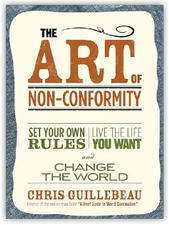This is a conversation between me and my future self, if my financial path wouldn’t have positively forked 2 years ago. The transcript is available here.
What would your future self have to say to you?
The no-pants guide to spending, saving, and thriving in the real world.
This is a conversation between me and my future self, if my financial path wouldn’t have positively forked 2 years ago. The transcript is available here.
What would your future self have to say to you?

This is a guest post.
Winning the lottery is everyone’s dream. You hit the lotto, cash in your ticket and kiss all your troubles goodbye, right? Actually, that might not be true. Just look at the number of lottery winners who’ve ended up worse off than they were before they hit it big. There are several problems here. One problem is that people often spend their money unwisely, without learning how to manage it properly. Lottery annuity payments were designed to help with this. However, those annuity payments might not actually be enough to make a significant difference in your life. If that’s the case, you might be wondering if you can sell your payments for a lump sum. The answer is, yes, you can. But there’s a catch. Actually, there are a couple of catches.
First, let’s talk about buyers. They’re the ones who’ll be paying you a lump sum for your lottery payments. Now, you can’t expect a buyer to offer the full amount you’re owed from the lottery, but you should be able to expect a significant percentage of the winnings. That’s not the case with many buyers. They recognize your desperation and have no qualms about taking advantage of your situation. That’s not true for all buyers, though. You need to recognize qualified buyers from those better left alone. Obviously, that’s tough to do on your own. Most people have never been in the position of having to sell lottery payments before, and it’s easy to get lost in a world with which you’re not familiar.
Another important consideration is whether you need to sell all of your lottery winnings or only a percentage of them. You can easily sell just a specific portion of your winnings, enough to cover your immediate needs, and retain the remainder as regular ongoing payments. This ensures that you have the money you need right now, as well as a financial cushion for the future.
The ideal solution to your quandary is to work with a firm that acts as a go-between. The company will vet and investigate buyers, ensuring that you only have the cream of the crop to choose from. Not only that, but working with a reputable firm will also ensure that you get the highest percentage possible of your winnings, rather than leaving you with a mere pittance.
Of course, not all such firms are the same, and you need to recognize a reputable company. Look for a firm that’s been in business for a number of years – one with an established reputation and a list of satisfied clients. Second, make sure the company doesn’t work for the buyers – the firm should work for you, the seller. This ensures there’s no conflict of interest. A company that works on behalf of the buyer has no incentive to go above and beyond to ensure you get a fair deal. One that works for you certainly does.

While jogging with my wife a few days ago, we had a conversation that we haven’t had in years. We discussed our dreams.
It’s an important conversation for couples to have. What are your hopes? What are your dreams? Where do you want to be in 10 years? In 20? In 50? Planning for the future gives you a map for the present.
My wife and I hadn’t had this conversation in years. A few days ago, we did. Our life-goals are simple and achievable.
I want to leave the corporate world and support my family with writing and the training classes I do. I want a chunk of land outside of any major metropolitan area, but close enough for the entertainment and shopping. I want enough land to expand my classes on my own property, relying on no one.
My wife wants enough land to have some horses. It was unspoken, but I think she wants my goals to take off so they can support her goals, too.
We want a comfortable retirement and we want to help the kids with college.
We’re a bit behind the game for college funding. That’s ok, though. There is nothing wrong with a kid working his way through college and learning those life lessons.
We are also behind on the retirement. But, if I can support us doing the things I love, I don’t need $X million. Retirement isn’t a cessation of activity, it is taking the time to do the things you love on your own schedule. If writing a book while sitting on my private range is enough to fund our life, that’s the perfect retirement.
This was a guest post on another site early last year.
Everyone, at times, has disagreements. How boring would life be if everyone agreed all of the time? How you handle those disagreements may mean disaster.
This is particularly true when you are arguing with your spouse. You spend most non-working moments with this one person, this wonderful, loving, infuriating person. Your emotions will naturally run high while discussing the things you care most about with the person you care most about. Arguments are not only natural, but inevitable.
How do you have an argument with someone you love without lasting resentment?
You have to argue fairly. There are a few principles to remember during an argument.
After all of this, it will finally be your turn to make your point. Hopefully, your partner will be following the same rules so you can solve your problems together, without learning to hate each other.
Arguments in your marriage aren’t–or shouldn’t be–intended to draw blood. Fights happen. If your goal is to win at any cost, you will both lose, possibly everything.


We grew up in a world of expectations: Eat your vegetables, don’t poop on the carpet, do your homework. It continues right up to “Go to college”, “Get married”, “Having a dozen kids”. Are those the expectations you want to use to guide your life?
Chris Guillebeau, author of The Art of Non-Conformity (the blog and the book) puts the question like this: We we were younger, we heard “If everyone else was jumping off of a cliff, would you do that too?” In theory, that meant we were supposed to think for ourselves. Yet, as adults, we are absolutely expected to conform and do the things everyone else is doing. Work your 40, take a week’s vacation once a year, and repeat until retirement or death.
Is that our only choice?
The Art of Non-Conformity attempts to be a guidebook, showing you how to live the live you want to live. Chris has made a lifelong series of decidedly unconventional choices, from dropping out of high school to attending 3 colleges simultaneously to spending 4 years as a volunteer in Africa. For the past few years, he has been working his way through visiting every country in the world. He is an expert on non-conformity.
The books tells a lot (a LOT) of stories of people who have either made the leap into a self-defined life or people who have done nothing but talk about taking that leap while staying comfortable in their soul-numbing careers.
The Art of Non-Conformity is an inspirational book. It spends a lot of time explaining how to break through the wall of fear to take control of your like. More important, it explains why you’d want to. It does not pretend to define how you should live your life, it just provides the framework for the mentality to help you make that decision for yourself.
If you’re looking for a step-by-step guide, complete with a list of possible work-alternatives, this isn’t the book for you. This book approaches lifestyle design from the conceptual end rather than the practical. If you want a practical manual, I’d get the 4 Hour Workweek by Timothy Ferris. Ideally, you should get both. They complement each other well.
Overall, I thoroughly enjoyed the book. If you’re considering taking a non-standard path or just hate the career- or life-track you are on, you should read The Art of Non-Conformity. I’m planning to read it again in a couple of weeks, just to make sure I absorb all of the lessons.